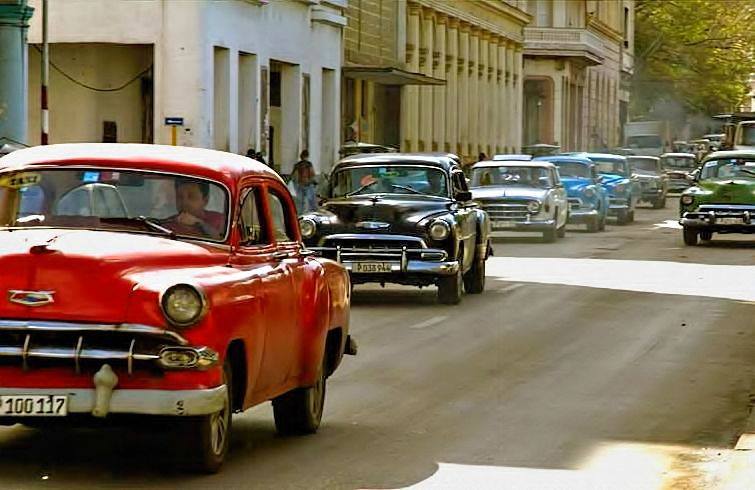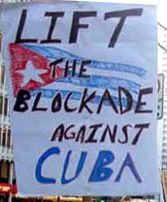
As U.S.-Cuba talks proceed: End the blockade!
Cuban and U.S. negotiators have announced progress after the second round of talks to formalize diplomatic relations between Cuba and the United States. Both delegations characterized the discussions as professional, respectful and constructive. A sticky point, however, is the U.S. persistence in keeping Cuba on the so-called state-supported terrorism list.
To someone who knows the history of U.S.-Cuban relations since 1959, that the U.S. State Department could designate Cuba “terrorist” brings hypocrisy to a new level. When there is a crisis or disaster anywhere in the world, Havana sends doctors; Washington sends Navy SEALs, drones and snipers. The only reason Cuba is on the terrorism list, and the U.S. isn’t, is that Washington draws up the list.
Last Dec. 17, Cuban President Raul Castro announced that the U.S. and Cuba would begin talks to reestablish relations that the U.S. broke in 1961. Since then, one round of negotiations took place on Jan. 22 in Havana and a second on Feb. 27 in Washington, D.C. Amid what Cuba’s chief negotiator Josefina Vidal Ferreiro calls “permanent communication,” technical discussions are scheduled in March on civil aviation, human trafficking, marine preservation, Internet capacity and the structure of human-rights dialog. An interagency U.S. delegation will go to Havana to discuss regulatory changes. Vidal is director general of Cuba’s Ministry of Foreign Affairs, U.S. Division.
Cuba’s immediate concerns are Washington’s listing it as a “State Sponsor of Terrorism” (SST) and denying its diplomatic corps in the U.S. banking rights. On Dec. 17, President Barack Obama had instructed the State Department to review its designation of Cuba. More than two months and two rounds of discussion later, Cuba is still on the list.
Secretary of State John Kerry has stated that removing the designation was separate from the negotiations for diplomatic relations. In the press conference following the Feb. 27 talks, most questions addressed this issue.
Vidal answered that Cuba wasn’t making the talks dependent on removing Cuba from the list, but she reiterated what was told to a State Department delegation last summer: “It would be difficult to explain that Cuba and the U.S. have established normal diplomatic relations while Cuba is on that list.”
Cuba’s good reputation, Washington’s intervention
 Cuba is renowned internationally for its quick and selfless intervention to save human lives in emergencies like the Ebola epidemic in West Africa, the earthquakes in Haiti and Pakistan, and mudslides and hurricanes in Central America. Cuba even offered to send 1,586 specialized health care professionals to the U.S. during hurricanes Rita and Katrina. Cuba has also taught millions to read, helping to eradicate illiteracy in many languages, including Indigenous dialects.
Cuba is renowned internationally for its quick and selfless intervention to save human lives in emergencies like the Ebola epidemic in West Africa, the earthquakes in Haiti and Pakistan, and mudslides and hurricanes in Central America. Cuba even offered to send 1,586 specialized health care professionals to the U.S. during hurricanes Rita and Katrina. Cuba has also taught millions to read, helping to eradicate illiteracy in many languages, including Indigenous dialects.
With the joint Cuban-Venezuelan “Operation Miracle,” Cuban doctors have performed cataract surgery that over the last decade restored or improved sight for more than 3 million people worldwide free of charge. (Cuba Debate, July 8, 2014)
In the same decade, the U.S. occupied Iraq and Afghanistan, killing hundreds of thousands of people, armed an insurgency that tore apart Syria and bombed and overthrew the Libyan government, leaving the land in chaos.
In the Western Hemisphere, the U.S. trained military forces throughout Latin America and the Caribbean to carry out torture and coup d’états.
The School of the Americas Watch described this branch of terrorism in a December 2014 press release: “[T]he Pentagon was forced to release seven Spanish-language training manuals that were used at the School of the Americas. They explicitly recommended abusive and unlawful interrogation techniques such as torture, extortion, blackmail and the targeting of civilian populations.”
There have been many protests at the “School of the Americas,” now in Georgia, and, since 2001, renamed the Western Hemisphere Institute for Security Cooperation.
Throughout the 1970s the U.S., in collusion with the military and intelligence services of Argentina, Bolivia, Brazil, Chile, Paraguay and Uruguay, carried out “Operation Condor” that led to the murder of 60,000 people, mostly left political activists and union leaders, as Larry Rohter wrote in his Jan. 24, 2014, New York Times blog.
The U.S. government began a terror campaign against the Cuban people soon after its 1959 revolution. Jane Franklin’s “Cuba and the United States: A Chronological History” details the campaign against Cuba that killed more than 3,000 people, touching almost every Cuban family. (janefranklin.info/Cuba.htm) Florida is home to Luis Posada Carriles, an admitted bomber of a Cuban airliner whom the U.S. protects.
Release of last of the Cuban 5
The Cuban 5 are state security agents who had been sent to the U.S. to infiltrate Florida-based paramilitaries actively engaged in bombing hotels and restaurants in Cuba. After being imprisoned since 1998, the last three of the five were released on Dec. 17 as key to opening U.S.-Cuba negotiations. This change in U.S. policy was an admission that terror against Cuba had failed to achieve the overtly stated U.S. goal of starving Cuba’s people into a pro-capitalist rebellion.
It was a first step in ending the U.S. economic, financial and commercial blockade of Cuba, which is still very much in place. The Cuban Interests Section in Washington, D.C., has been forced to conduct its consular work issuing passports and visas without access to a bank. All has been done on a cash basis for more than a year because its bank accounts were closed and no other bank would accept Cuban accounts. The U.S. government claims to be helping, but nothing has changed.
A small minority in Congress are scurrying to block diplomatic relations — while attacking the Obama administration — by further vilifying Black liberation activist Assata Shakur, who received asylum in Cuba. Neither right nor center, of course, will admit to U.S. state-supported terrorism.
Underlying the issue of removing the SST designation, normalizing banking and all the topics planned for discussion is the fundamental respect for Cuba’s sovereignty. It is not negotiable.
End the blockade!
* Cheryl LaBash is a co-chair of the National Network on Cuba and an organizer with the International Committee for the Freedom of the Cuban 5.
(From: Workers World)

